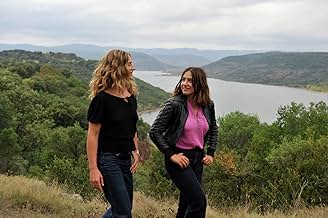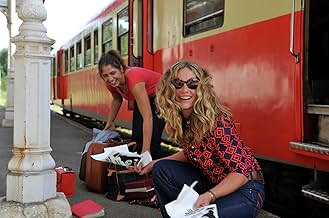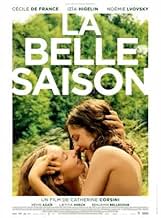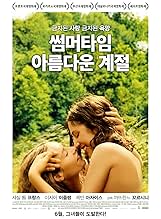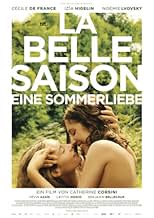CALIFICACIÓN DE IMDb
6.7/10
6.1 k
TU CALIFICACIÓN
Francia, años 70. Una joven de campo se muda a Paris en busca de independencia, al llegar se verá envuelta en una apasionante relación con una mujer muy involucrada en los inicios del movimi... Leer todoFrancia, años 70. Una joven de campo se muda a Paris en busca de independencia, al llegar se verá envuelta en una apasionante relación con una mujer muy involucrada en los inicios del movimiento feminista.Francia, años 70. Una joven de campo se muda a Paris en busca de independencia, al llegar se verá envuelta en una apasionante relación con una mujer muy involucrada en los inicios del movimiento feminista.
- Dirección
- Guionistas
- Elenco
- Premios
- 3 premios ganados y 8 nominaciones en total
Cécile de France
- Carole
- (as Cécile De France)
Natalie Beder
- Marie-Laure
- (as Nathalie Beder)
- Dirección
- Guionistas
- Todo el elenco y el equipo
- Producción, taquilla y más en IMDbPro
Opiniones destacadas
LGBT rights are more relevant than ever. In several countries, unfortunately, the trend is towards more difficult living conditions for gays and transgender people. Seen in such a perspective, the plot of this film remains relevant, despite the fact that it depicts a summer in 1971.
Although perhaps the problem here is something we have seen in many films, the film is experienced as both engaging and well told.
I sat thinking when I saw this movie; how many such fates exist? Both before and now? That people cannot live their lives to the fullest, in fear of condemnation from their surroundings. There are probably a lot of them, and in that way such films become important and unfortunately relevant. For such films we need. We need to be reminded of how the world treats and views queer people. In addition to a strong and pointed action, the film is also beautifully filmed, well directed and with good actors who get both convincing and engaging.
It's 1971 France. Delphine Benchiessa (Izïa Higelin) works at her family's rural farm. Her father berates her for being too slow to find a man. Unbeknownst to him, she's a lesbian. Her girlfriend surprises her by marrying a local boy. In Paris, she gets caught up with a group of militant feminists. She falls for their leader Carole (Cécile de France). After her father suffers a stroke, Delphine is forced to go home and take care of the farm.
It's another version of the tragic lesbian love story. I do wonder if 1971 France is a little too late to have this story. Usually, it's Victorian ladies on a gravel beach trying to discover lesbianism. In reality, rural conservatism and family dynamics do account for it. These ladies are not ignorant of the world. The 70's is not all disco and gay. It's still a fight for rights and acceptance. The danger isn't as high, and the story becomes smaller. Delphine could always run off and abandon the farm. It's not like society prevents her from getting a job in Paris. The issue becomes more internal and personal. It's a relationship movie.
It's another version of the tragic lesbian love story. I do wonder if 1971 France is a little too late to have this story. Usually, it's Victorian ladies on a gravel beach trying to discover lesbianism. In reality, rural conservatism and family dynamics do account for it. These ladies are not ignorant of the world. The 70's is not all disco and gay. It's still a fight for rights and acceptance. The danger isn't as high, and the story becomes smaller. Delphine could always run off and abandon the farm. It's not like society prevents her from getting a job in Paris. The issue becomes more internal and personal. It's a relationship movie.
Watching this film in the start of 'pride month.'
Summertime is an engaging love story in the 70's. This is a very sensitive portrayal of two women from different backgrounds in conservative, rural France. Set in the early 70s in the first flush of modern feminism, the plot is pretty simple and the issue simpler - will they stay together against the pressures of rural society? The film is very realistic as it deals with woman rights and also portrays the societal views on lesbian culture in the 70's. This is a very good representation of LGBTQ in the films.
As I was watching this film, I was very much reminded of another French film, "Blue is the Warmest Colour" which also deals with similar theme of lesbianism. I really love 'Blue is the Warmest Colour' and is my favourite romance film. However, this film is also a good film with good themes and lesbian representation. This film shows how it is to be a lesbian in a rural France in the 70's, how the society thinks of a girl involving with another girl.
Overall, it's a pretty good film which portrays a really interesting subject matter.
As I was watching this film, I was very much reminded of another French film, "Blue is the Warmest Colour" which also deals with similar theme of lesbianism. I really love 'Blue is the Warmest Colour' and is my favourite romance film. However, this film is also a good film with good themes and lesbian representation. This film shows how it is to be a lesbian in a rural France in the 70's, how the society thinks of a girl involving with another girl.
Overall, it's a pretty good film which portrays a really interesting subject matter.
An enjoyable film, with some great performances; but less travelled country roads should be rather more bumpy.
While a far from novel story, the three female leads (Izïa Higelin, Cécile de France and Noémie Lvovsky) give pitch perfect performances.
Where this film falls down is in giving the two lovers, far too smooth a ride. If you're fighting for freedom, surely the establishment would offer far more resistance? Here, the revolutionaries hardly seem to experience any push-back. There's one bump in the road, but that's really it.
While a far from novel story, the three female leads (Izïa Higelin, Cécile de France and Noémie Lvovsky) give pitch perfect performances.
Where this film falls down is in giving the two lovers, far too smooth a ride. If you're fighting for freedom, surely the establishment would offer far more resistance? Here, the revolutionaries hardly seem to experience any push-back. There's one bump in the road, but that's really it.
'La Belle Saison' is set in 1971 when women were asserting their rights – as indeed a lot of folk were doing the same to a world that was not really ready. This is set against the lives of Delphine from a rural farming family. She escapes to Paris where she happens to cross paths with the fiery Carole (Cécile de France – 'Meserine').
Then amidst the heady cocktail of feminism, liberation and radical politics they expressed themselves sexually – which of course was revolutionary. Yes they set about challenging the heterosexual orthodoxy - and found more than just a political statement in that they fell for each other.
Now there is tons more to this inspiringly brilliant film. It is made in such a way that the characters come alive and are completely believable. All the performances are outstanding and the period detail is really good too. The hair and fashions as well as the vehicles are spot on – and some nice Janis Joplin songs on the soundtrack too. There is so much here to like that it is a very easy job to recommend.
Then amidst the heady cocktail of feminism, liberation and radical politics they expressed themselves sexually – which of course was revolutionary. Yes they set about challenging the heterosexual orthodoxy - and found more than just a political statement in that they fell for each other.
Now there is tons more to this inspiringly brilliant film. It is made in such a way that the characters come alive and are completely believable. All the performances are outstanding and the period detail is really good too. The hair and fashions as well as the vehicles are spot on – and some nice Janis Joplin songs on the soundtrack too. There is so much here to like that it is a very easy job to recommend.
¿Sabías que…?
- TriviaDirector Catherine Corsini stated that she named the two main characters Carole and Delphine after real life artists and feminists Carole Roussopoulos and Delphine Seyrig.
- ErroresAfter a swim in the pond, the girls lay out to take some sun. As Carole lays naked on the blanket resting her head on Delphine, her arms are raised and we can see she does not have any underarm hair. As the girls start to kiss and caress Carole's armpit is exposed again but this time full of underarm hair.
- ConexionesReferenced in Théo et Hugo dans le même bateau (2016)
- Bandas sonorasL'Hymne du MLF, d'apres Le Chant des Marais
(Johann Esser/Wolfgang Langhoff/Rudi Goguel)
With the kind permission of Edition Peters Group
All rights reserved
Selecciones populares
Inicia sesión para calificar y agrega a la lista de videos para obtener recomendaciones personalizadas
- How long is Summertime?Con tecnología de Alexa
Detalles
- Fecha de lanzamiento
- Países de origen
- Sitio oficial
- Idiomas
- También se conoce como
- Summertime
- Locaciones de filmación
- Haute-Vienne, Francia(scenes in the country)
- Productoras
- Ver más créditos de la compañía en IMDbPro
Taquilla
- Presupuesto
- EUR 4,800,000 (estimado)
- Total en EE. UU. y Canadá
- USD 35,322
- Fin de semana de estreno en EE. UU. y Canadá
- USD 15,413
- 24 jul 2016
- Total a nivel mundial
- USD 3,778,938
Contribuir a esta página
Sugiere una edición o agrega el contenido que falta

![Ver Bande-annonce [OV]](https://m.media-amazon.com/images/M/MV5BMzZiZTVkNWItZGNjYS00ZDY2LWFkOGItZjhkNTk2NDQ3ZDE2XkEyXkFqcGdeQXRyYW5zY29kZS13b3JrZmxvdw@@._V1_QL75_UX500_CR0)


